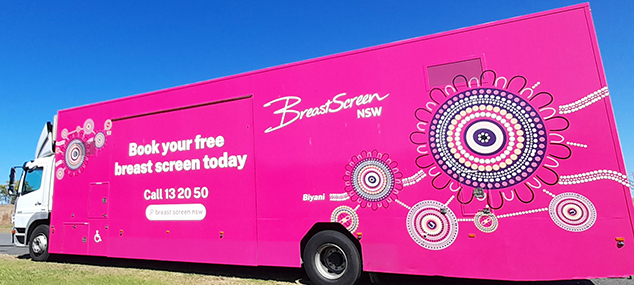
This Breast Cancer Awareness Month, women aged 50-74 from Northern NSW Local Health District are being urged to book in a free mammogram, with more than 40 (44.7) per cent of women in the region overdue for their two-yearly breast cancer screening.
Patrick Magee, Acting Director of BreastScreen NSW, North Coast Screening Assessment Service, said with around 300 local women expected to be diagnosed with breast cancer this year, now is the time to book in a free, life-saving breast screen.
“For women aged 50-74, a breast screen every two years is still the best way to detect breast cancer early – before it can be seen or felt,” Mr Magee said.
“If you’re aged 50 – 74, make breast screening a priority. It only takes 20 minutes and no doctor’s referral is needed.”
This Breast Cancer Awareness Month, BreastScreen NSW is also encouraging women to Be A Friend, Tell A Friend about the importance of having regular mammograms. Be A Friend, Tell A Friend encourages word of mouth and social media promotion among women to their friends, family and colleagues about the need to have regular mammograms.
Professor Tracey O’Brien AM, NSW Chief Cancer Officer and CEO of the Cancer Institute NSW, said if detected in its earliest stages, a woman’s five-year breast cancer survival rate is 98 per cent. This drops to 43.9 per cent if detected later, when it has spread to other organs.
“More than 6500 women in NSW are expected to receive a breast cancer diagnosis this year, and 1,000 women are expected to lose their lives to the disease in 2024, so we need to do everything we can to support women and encourage them to book in a life-saving breast screen,” Professor O’Brien said.
“Early detection not only significantly increases a person’s chance of survival it can also greatly reduce the need for invasive treatment like a mastectomy.
“I know how hard it can be to block out time for yourself. Unfortunately, breast cancer doesn’t wait, so I encourage all eligible women to stop and put themselves first – for themselves and their family.”
Breast cancer is the most common cancer in women with age and being female the biggest risk factors – not family history.
Women aged 50 – 74 years are recommended to have a breast screen every two years. BreastScreen NSW recommends Aboriginal women start screening at 40 years, with evidence showing that they are diagnosed with breast cancer at a younger age, have more advanced cancer at diagnosis and poorer survival rates compared to the overall female population.
Any woman who has noticed a change in their breasts, like a lump, should see their doctor without delay.
For more information and to make an appointment at a local BreastScreen NSW clinic or mobile van, call 13 20 50 or book online at www.breastscreen.nsw.gov.au.
For more information about the Be A Friend Tell A Friend promotion visit https://www.breastscreen.nsw.gov.au/breast-cancer-awareness-month/